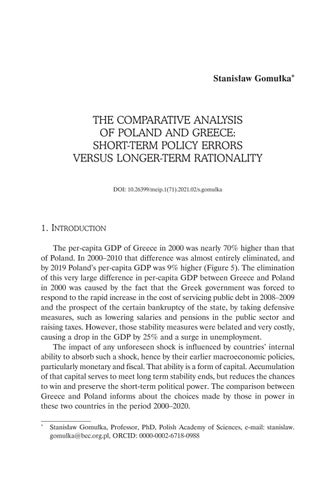Stanisław Gomułka*
THE COMPARATIVE ANALYSIS OF POLAND AND GREECE: SHORT-TERM POLICY ERRORS VERSUS LONGER-TERM RATIONALITY DOI: 10.26399/meip.1(71).2021.02/s.gomulka
1. INTRODUCTION The per-capita GDP of Greece in 2000 was nearly 70% higher than that of Poland. In 2000–2010 that difference was almost entirely eliminated, and by 2019 Poland’s per-capita GDP was 9% higher (Figure 5). The elimination of this very large difference in per-capita GDP between Greece and Poland in 2000 was caused by the fact that the Greek government was forced to respond to the rapid increase in the cost of servicing public debt in 2008–2009 and the prospect of the certain bankruptcy of the state, by taking defensive measures, such as lowering salaries and pensions in the public sector and raising taxes. However, those stability measures were belated and very costly, causing a drop in the GDP by 25% and a surge in unemployment. The impact of any unforeseen shock is influenced by countries’ internal ability to absorb such a shock, hence by their earlier macroeconomic policies, particularly monetary and fiscal. That ability is a form of capital. Accumulation of that capital serves to meet long term stability ends, but reduces the chances to win and preserve the short-term political power. The comparison between Greece and Poland informs about the choices made by those in power in these two countries in the period 2000–2020. *
Stanisław Gomułka, Professor, PhD, Polish Academy of Sciences, e-mail: stanislaw. gomulka@bcc.org.pl, ORCID: 0000-0002-6718-0988




